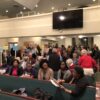November 9, 2013. WJCT News.
The Interfaith Coalition for Action, Reconciliation and Empowerment (ICARE) has joined the effort to stop the criminalization of first-time juvenile offenders in Jacksonville.
ICARE is a group of 39 churches who, along with the recently formed Jacksonville Juvenile Justice Coalition, are trying to reform policies that result in the minors entering the system.
“We’re trying to keep children out of the criminal justice system,” said Nancy Ricker, co-chair of ICARE’s Crime Committee.
ICARE focuses on issues of social justice; crime, low graduation rates, homelessness, jobs, and other community concerns, like mental health.
In March 2010, the Duval County public schools agreed to pilot a new ICARE program, “Restorative Justice,” which brings victims and offenders together to restore their relationship.
Ricker said United Way partners with ICARE to use their full-service schools and provide a full array of services to the families.
The coalition also started a neighborhood accountability board to prevent children from being arrested, but still hold them responsible for their crimes.
“It’s not just a child problem,” Ricker said, “It’s a family problem, and a community problem.”
Nancy said the first two schools to receive the Restorative Justice Student Accountability board, Southside Middle School and Englewood High School, are showing positive results.
Between the first and second year, Englewood High School experienced a reduction of 33.4 percent in violations and a reduction of 83.6 percent in suspensions.
Southside Middle School also shows positive results, with a 30.3 percent reduction in violations and 53.7 percent less suspensions.
At the 2011 Nehemiah Assembly in 2011, State Attorney Angela Corey, Sheriff John Rutherford and other officials agreed to use civil citations for misdemeanors and refer cases to the Neighborhood Accountability Boards.
As a result of the program’s success, the Duval public school system has expanded the program throughout Duval County and will train all officers in the civil citation process.
“We, as a community, need to find a way to bring people who have paid their dues back to the community and enable them not to go back down that road.”





